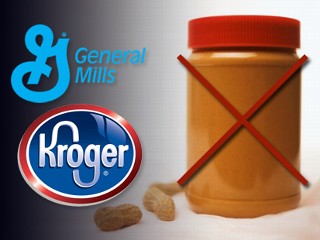AP is reporting that the Texas Department of State Health Services has ordered a recall of everything ever produced at Peanut Corp of America’s plant in Plainview TX.
The order came Thursday evening from the Department of State Health Services. The agency says "dead rodents, rodent excrement and bird feathers" were discovered Wednesday in a crawl space above a production area.
A state inspection also found that the unit’s air handling system was pulling debris from the infested crawl space into production areas.
The plant began operating in March 2005 but was shut down earlier this week.
The health department order also requires the plant to stop producing and distributing food products.
This will lead to more recalls — the FDA’s searchable database already lists over 2000.
Some choice quotes:
Robert Grauer, president of In a Nut Shell, a San Leandro, Calif., said he’s not taking any chances. The company has about 200 cases of peanuts from the Texas plant, and has to decided to hold them in storage.
"We’re not going to take a chance risking our customers — not over some peanuts."
Ken Werner, owner of Werner Gourmet Meat Snacks Inc. in Tillamook, Ore., said fewer than 20 of his company’s roughly 100 products contain peanuts. He recalled trail mixes and peanuts that were covered under earlier recalls linked to the Georgia plant. But he hadn’t yet recalled any products linked to the Texas plant.
"We’re waiting to hear from the FDA as far as a recall," he said. "If they issue a recall, we’ll recall more products."
The Bergin Fruit & Nut Co. in St. Paul, Minn., has had nearly 2,000 pounds of raw redskin and blanched peanuts on hold since late January, when Peanut Corp. issued an expanded recall that included products produced at its Georgia plant as far back as 2007, said quality control manager Bill Jaspers.
"We will probably be destroying it because, frankly, I think PCA has got bigger problems than a product recall," he said.

 Parnell sat stiffly, his hands folded in his lap at the witness table, as Rep. Greg Walden, R-Ore., held up a clear jar of his company’s products wrapped in crime scene tape and asked him if he would be willing to eat the food.
Parnell sat stiffly, his hands folded in his lap at the witness table, as Rep. Greg Walden, R-Ore., held up a clear jar of his company’s products wrapped in crime scene tape and asked him if he would be willing to eat the food. Henry Waxman, chairman of the House Committee on Energy and Commerce, was quoted as saying, “This company cared more about its financial bottom line than it did about the safety of its customers.”
Henry Waxman, chairman of the House Committee on Energy and Commerce, was quoted as saying, “This company cared more about its financial bottom line than it did about the safety of its customers.” 
 Early reporting
Early reporting  The Texas Department of Health said in a statement the plant temporarily closed Monday night at the request of health officials after the tests found "the possible presence of salmonella" in some of its products.
The Texas Department of Health said in a statement the plant temporarily closed Monday night at the request of health officials after the tests found "the possible presence of salmonella" in some of its products..jpg) At a gas station in North Fulton, Karan Singh eyed with suspicion a pile of energy bars, cookies and snacks that had been laid at the check-out counter for purchase, telling a customer,
At a gas station in North Fulton, Karan Singh eyed with suspicion a pile of energy bars, cookies and snacks that had been laid at the check-out counter for purchase, telling a customer, Kroger stores are alerting customers who have a Kroger Plus Card of any recalled purchases through automated phone calls.
Kroger stores are alerting customers who have a Kroger Plus Card of any recalled purchases through automated phone calls..jpg) Third-party audits are an incomplete form of verification that provide a limited view of a producer’s facilities and documentation but do not effectively reduce risk. …At some point, folks will figure out that all these outbreaks of foodborne illness – like Salmonella in peanut butter – happened at places that passed so-called independent audits.
Third-party audits are an incomplete form of verification that provide a limited view of a producer’s facilities and documentation but do not effectively reduce risk. …At some point, folks will figure out that all these outbreaks of foodborne illness – like Salmonella in peanut butter – happened at places that passed so-called independent audits.(1).jpg) Kris Charles, a spokeswoman for Kellogg, said,
Kris Charles, a spokeswoman for Kellogg, said, —including
—including  It could just be that recalls are scary.
It could just be that recalls are scary.